#ca foundation books
Text
Online vs. Offline Study: Which is Better for CA Exam Prep?

For those who want to become accountants, preparing for the Chartered Accountancy (CA) exam is an important step. With so many options at their disposal these days, students frequently struggle to decide between using online and offline study techniques. Each has advantages, and the decision is mostly based on learning preferences and styles. Here, we examine the benefits and drawbacks of each strategy to assist you in selecting the best one for preparing for the CA exam.
The Case for Online Study
1. Accessibility and Convenience:
One of the biggest advantages of online study is accessibility. Students can access study material for CA from anywhere, at any time. This flexibility is particularly beneficial for those balancing work, internships, or other commitments.
2. Updated Content:
Online platforms frequently update their content, ensuring that students have access to the latest CA entrance exam books and study materials. This is crucial for an exam like CA, where the syllabus and regulations can change.
3. Interactive Learning:
Interactive learning tools including discussion boards, tests, and video lectures are available in a lot of online study resources. These can enhance understanding and retention of complex concepts found in CA Foundation books and CA final books.
4. Cost-Effective:
The cost of online resources is frequently lower than that of offline ones. Students can find a plethora of free or reasonably priced books for CA exams and supplementary study materials online.
The Case for Offline Study
1. Structured Learning:
Studying offline offers a more structured setting. Examples of offline study strategies include using physical CA test materials or coaching classes. This can support students in keeping up a regular study routine, which is necessary for in-depth planning.
2. Personal Interaction:
In offline situations, face-to-face interactions with peers and teachers can be quite beneficial. These exchanges provide more individualized instruction, prompt feedback, and doubt clarification.
3. Reduced Distractions:
Distractions that are frequently present when studying online can be reduced by studying offline. Students can concentrate better on their CA entrance exam books and other study materials if they are not distracted by the internet's incessant updates and temptations.
4. Tangible Resources:
For many kids, it's simpler to navigate through real books than digital ones. Studying can be improved by having the capacity to swiftly turn pages, comment, and highlight text.
Combining Both Methods
A combination of methods that blend online and offline study techniques can prove to be the most efficacious for numerous students. Here's how to take advantage of both:
1. Use Online Resources for Supplementary Learning:
Use internet resources to enhance your traditional CA exam materials with additional study. Participate in online forums to discuss issues with peers or watch video lectures to gain understanding of complex subjects.
2. Regularly Update Your Knowledge:
Keep yourself informed about the most recent modifications to the CA syllabus by often visiting internet resources. This guarantees the accuracy of the data in your CA books.
3. Attend Offline Coaching Classes:
To take advantage of supervised instruction and one-on-one time with a coach, sign up for in-person coaching sessions. To reinforce the material you study in these classes, use online resources.
4. Practice with Online Mock Tests:
Utilize online practice exams to gauge your degree of readiness. These exams assist you in identifying areas that require development by simulating the real exam setting.
Conclusion
The question of whether to prepare for the CA exam offline or online ultimately comes down to personal preference. While offline study gives more structure, one-on-one connection, and less interruptions, online study offers flexibility, cost-effectiveness, and access to current content. One can create a thorough and successful preparation strategy by taking a balanced approach that incorporates the best features of both approaches.
#ca final books#study material for ca#books for ca exam#ca foundation books#ca intermediate books#ca entrance exam books
0 notes
Text
Complete Guide to CA After 12th
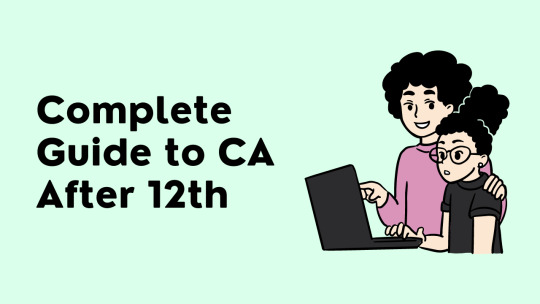
It can be exciting and difficult to start your road toward becoming a Chartered Accountant (CA) as soon as you finish your 12th grade. You will find all the information you need about the CA course in this all-inclusive guide, which includes eligibility requirements, for your CA Exam preparation.
Eligibility Criteria
To pursue a CA course after 12th, you need to meet the following eligibility criteria:
Educational Qualification: You must have completed your 12th grade from a recognized board.
Minimum Marks: There is no minimum percentage required in the 12th grade to register for the CA Foundation Course.
Course Structure
The CA course is structured in three levels:
CA Foundation: This is the entry-level exam.
CA Intermediate: This level requires deeper knowledge and understanding.
CA Final: This is the last stage before you become a certified Chartered Accountant.
CA Foundation
The CA Foundation Course is the first step in the CA journey. It covers four subjects:
Principles and Practice of Accounting
Business Laws and Business Correspondence and Reporting
Business Mathematics, Logical Reasoning, and Statistics
Business Economics and Business and Commercial Knowledge
To excel in these subjects, it's crucial to refer to the right CA Foundation Books.These books provide a solid foundation and help in understanding the basic concepts.
CA Intermediate
After passing the CA Foundation, the next step is the CA Intermediate Course, which comprises two groups with four papers each:
Group I:
Accounting
Corporate and Other Laws
Cost and Management Accounting
Taxation
Group II:
Advanced Accounting
Auditing and Assurance
Enterprise Information Systems & Strategic Management
Financial Management & Economics for Finance
Using the best CA Intermediate Books is essential to grasp the complex topics covered in this level. These books not only provide in-depth knowledge but also include practical problems to enhance your understanding.
CA Final
The CA Final Course is the ultimate stage. It consists of two groups, each containing four papers:
Group I:
Financial Reporting
Strategic Financial Management
Advanced Auditing and Professional Ethics
Corporate and Economic Laws
Group II:
Strategic Cost Management and Performance Evaluation
Elective Paper (Choose one from Risk Management, Financial Services & Capital Markets, International Taxation, Economic Laws, Global Financial Reporting Standards, Multidisciplinary Case Study)
Direct Tax Laws and International Taxation
Indirect Tax Laws
To succeed in the CA Final, it’s critical to use comprehensive CA Final Books and Study Material For CA. These resources provide detailed explanations, practical problems, and case studies.
Essential Study Materials
Study Material For CA
ICAI provides official study materials for all levels. These materials are meticulously designed to cover the entire syllabus comprehensively. They are essential for understanding the core concepts and for exam preparation.
Scanner CA Books
Scanner CA Books are invaluable for exam preparation. They compile previous years’ question papers along with suggested answers. Scanners help you understand the exam pattern, important topics, and the type of questions frequently asked.
Conclusion
Becoming a Chartered Accountant after the 12th grade is a structured yet challenging journey. With the right approach, dedication, and the best study materials like CA Entrance Exam Books, you can navigate through each level successfully. Remember, consistency and hard work are the keys to achieving your goal of becoming a CA. Good luck!
#books for ca exam#scanner for ca intermediate books#ca entrance exam#ca entrance exam books#ca foundation books#ca intermediate books#study material for ca#ca final books
0 notes
Text
How to Choose the Best Reference Books for CA Intermediate Exam Success
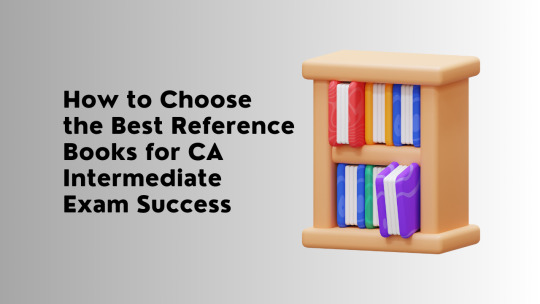
How to Choose the Best Reference Books for CA Intermediate Exam Success
Choosing the right reference CA Intermediate books is paramount to success in the CA Intermediate exam. With numerous options available, it can be daunting to determine which ones will best suit your needs. In this comprehensive guide, we'll explore the key factors to consider when selecting reference books for CA Intermediate exam preparation.
Understanding Your Exam Syllabus
The first step in choosing the best CA Entrance Exam books is to thoroughly understand the CA Intermediate exam syllabus. Familiarize yourself with the topics covered in each subject and the depth of knowledge expected. This will help you identify the specific areas where you may need additional support from reference books.
Quality of Content and Author Reputation
When evaluating reference books, prioritize those authored by reputable professionals or renowned publishers in the field of CA education. Look for books that offer clear and concise explanations of complex concepts, supplemented with practical examples and illustrations. Assess the author's credentials and expertise to ensure the credibility of the content.
Alignment with Study Material and Revision Guides
Ensure that the reference books you choose align with your primary ca intermediate study material and revision guides. Consistency in content and terminology between your main textbooks and reference books can facilitate easier comprehension and integration of concepts. Look for supplementary reference books that complement your primary study resources rather than duplicate them.
Comprehensive Coverage of Exam Topics
Select reference books that provide comprehensive coverage of all topics included in the CA Intermediate exam syllabus. Ideally, the books should offer in-depth explanations and analysis of each subject area, leaving no gaps in your understanding. Pay attention to the level of detail provided and ensure that all relevant topics are adequately addressed.
Clarity and Accessibility of Language
Opt for reference CA Intermediate books that present complex concepts in a clear and accessible manner. The language used should be easy to understand, avoiding unnecessary jargon or technical language that may hinder comprehension. Look for books that employ logical progression and structured organization to guide your learning effectively.
Practice Questions and Mock Tests
Consider reference books like Scanner CA Entrance Exam Books that include practice questions and mock tests to reinforce your learning and assess your progress. Practice questions allow you to apply theoretical knowledge to practical scenarios, while mock tests simulate the exam environment and help you gauge your readiness. Look for books with a diverse range of practice questions and varying levels of difficulty to challenge yourself effectively.
Recommendations from Peers and Mentors
Seek recommendations from peers, mentors, or CA professionals who have successfully cleared the Intermediate exam. Their insights and experiences can help you identify valuable reference books that may not be widely known but are highly effective. Additionally, online forums and study groups can provide valuable feedback and recommendations based on collective experiences.
Flexibility and Adaptability in Learning Styles
Choose reference books that cater to different learning styles and preferences. Some students may prefer Scanner CA Intermediate books with detailed explanations, while others may benefit from concise summary guides or visual aids. Consider your individual learning preferences and select reference books that align with your preferred study approach for maximum effectiveness.
Conclusion
Selecting the best reference CA Intermediate books for CA Intermediate exam success requires careful consideration of various factors, including content quality, alignment with study material, comprehensiveness, language clarity, and affordability. By following the guidelines outlined in this guide and conducting thorough research, you can make informed decisions and equip yourself with the necessary resources to excel in your exam preparation. Remember that the ultimate goal is to choose reference books that enhance your understanding, reinforce learning, and boost your confidence in tackling the CA Intermediate exam with proficiency and ease.
0 notes
Text
Top Five Reasons Why People Quit Pursuing a Chartered Accountant (CA) Qualification
Introduction
Becoming a Chartered Accountant (CA) is a prestigious and rewarding career path, but it's not for everyone. Many aspirants embark on this journey but, along the way, decide to change course. In this article, we'll explore the top five reasons why people often choose to quit pursuing a CA qualification.
1. Exam Difficulty and Failure (The Weight of CA Examinations):
The difficulty of CA exams is a formidable hurdle for many aspirants. These exams are notorious for their intricate and demanding content, creating immense pressure to succeed. Consequently, the weight of these examinations can become overwhelming, causing a sense of demotivation among candidates, especially when faced with repeated failures. This discouragement often culminates in individuals reconsidering their pursuit of a CA qualification. The relentless challenges posed by CA exams can test one's determination and resilience, making it a prominent reason why some opt to abandon this demanding career path.
2. Stress and Burnout (Balancing Act):
The path to CA exams necessitates a rigorous study regimen, demanding prolonged hours of intense focus. This endeavor often results in a delicate balance between work, personal life, and studies. Striving to maintain this equilibrium can lead to considerable stress, pushing individuals toward severe burnout. The pressures of managing responsibilities can take a toll on mental and physical well-being, making it progressively challenging to sustain optimal health. The toll of this balancing act can be overwhelming, prompting some aspirants to question their ability to continue, and ultimately causing them to contemplate quitting their pursuit of a CA qualification.
3. Lengthy and Demanding Program (The Marathon of CA Studies):
The journey through the CA program is more akin to a marathon than a sprint. It's a protracted process, spanning several years, encompassing numerous levels and exams. This extended duration can be disheartening for individuals who aspire to enter the workforce promptly. The commitment required to complete the program can appear daunting, particularly to those eager to kick-start their careers. The prolonged timeline becomes a significant factor that discourages some from continuing on this demanding path. For those seeking quick professional entry, the lengthy and demanding nature of the CA program may prompt them to reconsider and explore alternative career routes.
4. Financial Burden (The Cost of Excellence):
Achieving a CA qualification often comes with a significant financial burden. The expenses linked to coaching classes, study materials, and exam fees can accrue swiftly, exerting immense pressure on aspirants. For those grappling with financial constraints or struggling to secure sufficient financial support, this burden can become insurmountable. It necessitates a careful evaluation of priorities and resources. Some individuals may be compelled to reevaluate their pursuit of a CA qualification due to the daunting cost implications, diverting their attention toward more financially viable career options. The substantial financial investment required can indeed serve as a formidable deterrent on this demanding journey.
5. Alternative Career Opportunities (Diverging Paths):
Life is replete with unforeseen opportunities, and some CA aspirants may stumble upon enticing job offers or uncover alternative career avenues that resonate more with their aspirations and passions. These newfound opportunities can be compelling, often aligning better with their personal and professional goals. As a result, their focus may gradually shift away from completing the demanding CA program. The allure of alternative career paths can be a strong motivator for individuals to reconsider their commitment to the CA qualification. It highlights the ever-evolving nature of career choices and how unexpected options can divert them from their initial pursuit.
Conclusion
Becoming a Chartered Accountant is a commendable goal, but it's essential to recognize that the journey is demanding, both mentally and financially. Not everyone who starts down this path will reach the destination. The top five reasons mentioned above are common factors that lead individuals to reconsider their CA aspirations. It's crucial to assess one's commitment, resources, and personal circumstances before embarking on this challenging journey.
0 notes
Text
How to Successfully Balance Work and Study as a Working Professional Pursuing CA

As a working professional pursuing a Chartered Accountant (CA) qualification, finding the right balance between work and study can be challenging. However, with proper planning, effective time management, and a structured approach, you can navigate through this demanding phase of your career. In this comprehensive guide, we will provide you with valuable insights and practical tips to help you excel both in your professional life and your CA studies.
1. Establish Clear Goals and Priorities
To effectively balance work and study, it is crucial to set clear goals and priorities. Start by defining your short-term and long-term objectives. Outline the specific milestones you want to achieve in your career and the progress you aim to make in your CA studies. Also, it is very important to choose the right CA Exam study material to achieve your goal successfully. By having a clear vision of what you want to accomplish, you can align your efforts and make informed decisions about how to allocate your time and energy.
2. Create a Well-Structured Schedule
Developing a well-structured schedule is key to managing your time efficiently. Allocate dedicated time slots for both work and study, ensuring that you have sufficient time for each without compromising on either. Consider your work commitments, study requirements, and personal responsibilities while creating your schedule. Remember to be realistic about the time required for studying and allow for breaks to maintain focus and prevent burnout.
3. Utilise Productive Study Techniques
To make the most of your study time, it is essential to employ effective study techniques. Consider adopting the following strategies:
a. Active Learning: Actively engage with the study material by taking notes, asking questions, and participating in discussions. This approach enhances your understanding and retention of the subject matter.
b. Time Blocking: Break your study sessions into smaller, manageable blocks of time. Focus on one topic or task during each block, allowing for better concentration and increased productivity.
c. Prioritise Difficult Topics: Begin your study sessions with the most challenging topics while your mind is fresh. Take the help of some of the best ca entrance exam books to understand these tough topics well. Tackling difficult subjects first will ensure you have ample time and mental energy to grasp complex concepts.
d. Practice Regularly: Regular practice is vital for mastering CA concepts. Solve practice questions, attempt mock exams, and seek feedback to identify areas that need improvement and refine your knowledge.
4. Seek Support from Colleagues and Peers
Don't hesitate to reach out to your colleagues and peers who are also pursuing or have completed their CA qualification. They can provide valuable insights, guidance, and emotional support during your journey. Engage in study groups, attend networking events, or join online communities where you can connect with like-minded professionals facing similar challenges. Use some of the best CA Foundation books so that you can understand the concepts more easily. Sharing experiences and learning from others can greatly contribute to your success.
5. Maintain a Healthy Work-Life-Study Balance
While it's essential to dedicate time to both work and study, it's equally important to maintain a healthy work-life-study balance. Here are some tips to help you achieve this:
a. Prioritise Self-Care: Take care of your physical and mental well-being. Ensure you get enough sleep, eat a balanced diet, and engage in regular exercise. Allocate time for activities you enjoy to rejuvenate and reduce stress.
b. Set Boundaries: Establish boundaries between work, study, and personal life. Clearly communicate your availability to your colleagues, family, and friends. Avoid overcommitting yourself and learn to say no when necessary.
c. Practice Time Management: Adopt effective time management techniques, such as the Pomodoro Technique or time-blocking. By allocating specific time slots for work, study, and personal activities, you can maintain a sense of control over your schedule.
d. Take Breaks: Allow yourself regular breaks throughout the day to recharge. Stepping away from work or study for a few minutes can improve focus and overall productivity.
6. Continuously Evaluate and Adapt
As you progress through your journey of balancing work and study, it's essential to regularly evaluate your strategies and make necessary adjustments. Assess your schedule, study techniques, and overall well-being to identify areas that require improvement. Stay adaptable and open to new approaches that may better suit your evolving needs.
Conclusion
Balancing work and study as a working professional pursuing a CA qualification is undoubtedly demanding, but with proper planning, effective time management, the right choice of study material, and a focus on self-care, you can achieve success. Remember, finding the right balance is a continuous process that requires dedication, perseverance, and adaptability. By implementing the strategies outlined in this guide, you can thrive both in your professional career and in your pursuit of becoming a qualified CA.
0 notes
Photo
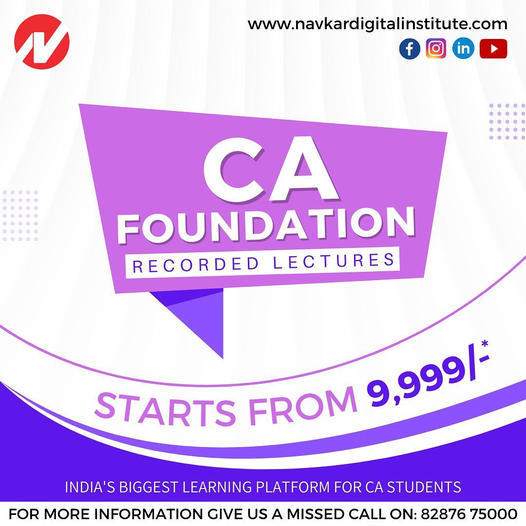
CA Foundation Online Classes | CA Foundation Study Material | CA Foundation Syllabus and Subjects | CA Foundation Course Syllabus | Navkar Digital Institute
CA Foundation Course is the entry-level for the Chartered Accountancy Course offered by the Institute of Chartered Accountants of India (ICAI).
We at Navkar Digital Institute offer CA Foundation Recorded Video Lectures based on New Syllabus, which will help every CA Foundation Aspirant to manage their studies and do it in an organized way.
To get more details about CA Foundation Online Classes then you can call us at +91 7567712000 or +91 9081910714 or visit at https://www.navkardigitalinstitute.com/courses/online-ca-courses/ca-foundation/
#CA Foundation Syllabus#ca foundation study material#ca foundation books#CA Foundation Online Classes
0 notes
Text
Is 70 Days enough to Clear the CA Final Group 1 from Scratch ?
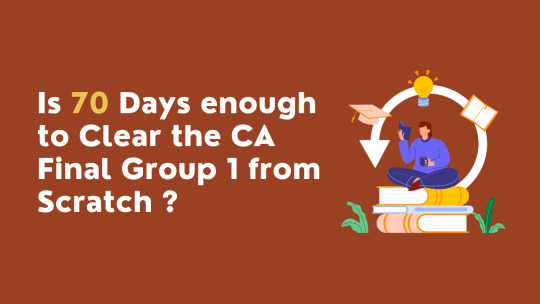
The Chartered Accountancy (CA) Final is one of the most challenging exams in the field of finance and accounting. Clearing CA Final Group 1 requires not only a solid understanding of complex concepts but also the ability to apply them in various scenarios. If you’re starting from scratch with just 70 days to prepare, the task might seem daunting, but it is not impossible. With the right strategy, focus, and discipline, you can significantly improve your chances of success. One valuable resource to consider during your preparation is using Scanner CA Final books. These books can help you identify important topics and frequently asked questions, providing a targeted approach to your study plan.
1. Understand the Syllabus and Prioritize
The first step is to thoroughly understand the syllabus for CA Final Group 1. The group covers four key subjects:
Financial Reporting
Strategic Financial Management (SFM)
Advanced Auditing and Professional Ethics
Corporate and Economic Laws
Given the vastness of the syllabus, it's essential to prioritize topics based on their weightage in the exam. Focus on high-scoring areas first, ensuring that you cover essential topics that are likely to appear in the exam. Create a study plan that allocates sufficient time to each subject, with more time dedicated to complex topics.
2. Create a Detailed Study Plan
A well-structured study plan is crucial when you have limited time. Break down the 70 days into weeks and further into days, assigning specific topics and chapters to each day. Ensure that your plan includes time for revision and practice exams. A suggested plan might look like this:
Focus: Core Subjects Overview
Day 1-2: Review Subject 1 - Read through main topics and key chapters.
Day 3-4: Practice questions from the CA Final scanner for Subject 1.
Day 5-6: Review Subject 2 - Focus on important chapters and concepts.
Day 7: Practice questions from the CA Final scanner for Subject 2.
Weeks 3-4:
Focus: Deep Dive into Subjects
Day 8-10: Study Subject 1 in detail - Major topics and past papers.
Day 11-13: Practice questions from the CA Final scanner for Subject 1.
Day 14: Revision of Subject 1.
Day 15-17: Study Subject 2 in detail - Major topics and past papers.
Day 18-20: Practice questions from the CA Final scanner for Subject 2.
Day 21: Revision of Subject 2.
Weeks 5-6:
Focus: New Subjects and Integration
Day 22-24: Study Subject 3 - Main topics and key areas.
Day 25-27: Practice questions from the CA Final scanner for Subject 3.
Day 28: Revision of Subject 3.
Day 29-31: Study Subject 4 - Major topics and focus areas.
Day 32-34: Practice questions from the CA Final scanner for Subject 4.
Day 35: Revision of Subject 4.
Weeks 7-8:
Focus: Mock Exams and Revision
Day 36-38: Take mock exams for Subjects 1 and 2.
Day 39-40: Review and analyze mock exam results for Subjects 1 and 2.
Day 41-43: Take mock exams for Subjects 3 and 4.
Day 44-45: Review and analyze mock exam results for Subjects 3 and 4.
Weeks 9-10:
Focus: Final Revision and Exam Strategy
Day 46-48: Revise all subjects with a focus on weaker areas.
Day 49-51: Final practice with CA Final scanner questions for all subjects.
Day 52-53: Take full-length mock exams and analyze results.
Day 54-56: Adjust study focus based on mock exam results.
Weeks 11-10:
Focus: Final Preparation
Day 57-59: Intensive revision of key topics and weak areas.
Day 60-62: Review important formulas, concepts, and CA Final scanner summaries.
Day 63-65: Take final mock exams to gauge preparedness.
Day 66-68: Review mock exam results and refine strategy.
Day 69-70: Relax and ensure you’re well-rested for the exam day.
3. Focus on Conceptual Clarity
Starting from scratch means you need to build your foundation quickly. Focus on understanding the concepts rather than rote memorization. CA exams test your ability to apply knowledge, so ensure that you grasp the underlying principles of each topic. Use study materials, reference books, online resources, and CA Final scanner to aid your understanding. If you come across any difficult concepts, don’t hesitate to seek help from peers, mentors, or online forums.
4. Practice, Practice, Practice
Practicing problems and case studies is crucial to reinforce your learning with the right study material for CA. Dedicate time each day to solve problems, especially in subjects like Financial Reporting and SFM. For auditing and law, practice writing answers to theoretical questions, focusing on structuring your answers clearly and concisely. Additionally, take timed mock tests using comprehensive study CA to simulate the exam environment and improve your time management skills.
5. Maintain Discipline and Stay Positive
With only 70 days at your disposal, discipline is key. Stick to your study plan religiously, avoid distractions, and maintain a consistent study routine. It’s easy to get overwhelmed, but staying positive and confident in your abilities is essential. Utilize recommended books for the CA exam
to ensure you cover all necessary material. Take short breaks to recharge, but ensure they don't derail your focus.
6. Revise Regularly
Revision is critical in the final weeks leading up to the CA entrance exam. Make sure you revisit important topics from your CA entrance exam books multiple times and practice recalling information without looking at your notes. Summarize key points from these books and create quick reference sheets for last-minute revision.
Conclusion
While 70 days is a tight timeline to prepare for CA Final Group 1 from scratch, it’s not an impossible task. Success will depend on how effectively you manage your time, the clarity of your concepts, and the amount of practice you put in. By following a disciplined approach and staying focused on your goal, you can maximize your chances of clearing the exam. Remember, perseverance and determination are just as important as your study strategy. Good luck!
#ca entrance exam books#study material for ca#scanner ca foundation books#books for ca exam#ca intermediate scanner#scanner ca intermediate books
0 notes
Text
Exploring the Benefits of Pursuing a CA Qualification
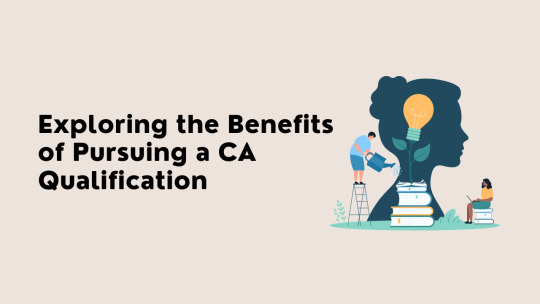
The Chartered Accountancy (CA) qualification is one of the most prestigious and sought-after credentials in the field of accounting and finance. Pursuing a CA qualification is a challenging yet rewarding journey that opens up a world of opportunities for those who are passionate about numbers, financial management, and business strategy. To succeed in this journey, choosing the right books for the CA exam is crucial, as they play a significant role in understanding complex concepts and acing the exams. In this blog, we will explore the numerous benefits of earning a CA qualification.
1. High Demand and Global Recognition
One of the most significant benefits of becoming a CA is the global recognition and respect the qualification commands. CAs are highly valued for their expertise in financial management, auditing, taxation, and strategic financial planning. The CA qualification is recognized in many countries, making it easier for professionals to work internationally. Whether you choose to work in public practice, corporate finance, or as an independent consultant, the CA credential provides a competitive edge in the job market. To excel in the CA Final exams, many aspirin CAs rely on resources like scanner CA Final books, which offer a thorough review of past exam questions and solutions, helping them prepare effectively for the challenges ahead.
2. Diverse Career Opportunities
Gaining a CA qualification makes it possible to pursue a variety of professional paths in numerous industries. CAs can have leadership positions in strategy, management, and finance in addition to typical accounting jobs. Key positions that CAs can seek include the following:
Auditor: Ensuring the accuracy of financial statements and compliance with regulatory standards.
Tax Consultant: Advising individuals and businesses on tax planning, compliance, and optimization.
Financial Analyst: Analyzing financial data to guide investment decisions and corporate strategy.
Chief Financial Officer (CFO): Leading the financial operations of an organization and driving its financial strategy.
Business Advisor: Providing strategic advice to businesses on growth, risk management, and financial planning.
Professionals can transition between different industries and professions as a result of the CA qualification's adaptability, which makes it a dynamic and flexible career path.
3. Strong Earning Potential
The earning potential for CAs is outstanding, with competitive salary and the potential for significant financial advantages. The earning potential of a chartered accountant increases dramatically with experience and promotion into more senior positions. Because of their combination of specialized skills, widespread reputation, and high demand, chartered accountants (CAs) typically command more salary than other professionals in the accounting and financial domain. For aspiring CAs, using resources like the CA Foundation Scanner can be invaluable in preparing for exams, ensuring a strong foundation that sets the stage for future success and higher earning potential.
4. Professional Growth and Continuous Learning
Achieving the CA qualification requires a commitment to ongoing professional growth rather than just passing exams. The world of accounting and finance is always changing, and certified public accountants (CAs) must keep up with the newest rules, practices, and trends in the field. Because of their dedication to lifelong learning, CAs are able to maintain their leadership positions in their fields and provide significant benefits to their employers.
5. Job Security and Stability
In an ever-changing economic environment, job security is a significant consideration for many professionals. The CA qualification provides a high level of job security due to the essential nature of accounting and financial management in all businesses. Regardless of economic conditions, organizations will always need skilled professionals to manage their finances, audit their books, and ensure compliance with regulations. Additionally, the availability of comprehensive study material for CA candidates ensures that aspiring professionals are well-prepared to meet these demands, further solidifying their job security in the field.
6. Entrepreneurial Opportunities
For those with an entrepreneurial spirit, a CA qualification can be a stepping stone to starting your own practice or business. The financial acumen, strategic thinking, and business knowledge gained during the CA journey equip professionals with the skills needed to successfully manage and grow their own ventures.
Conclusion
Pursuing a CA qualification is a challenging but immensely rewarding journey that offers numerous benefits, including global recognition, diverse career opportunities, strong earning potential, and job security. Whether you aspire to climb the corporate ladder, start your own business, or work internationally, the CA qualification provides the foundation for a successful and fulfilling career in accounting and finance. To excel in this journey, CA entrance exam books are essential resources that will guide you through the rigorous preparation process. If you are passionate about numbers and have a strong desire to make a difference in the financial world, becoming a Chartered Accountant could be the perfect path for you.
#Scanner CA Final Books#CA foundation scanner#Study Material for CA#CA Entrance Exam Books#Books for CA Exam
0 notes
Text
How to Stay Motivated Throughout Your CA Exam Journey

Embarking on the journey to become a Chartered Accountant (CA) is no small feat. It demands immense dedication, hard work, and resilience. Staying motivated throughout this journey can be challenging, but it is crucial for success. Utilizing resources like the CA Intermediate Scanner can significantly aid your preparation. Here are some effective strategies to help you maintain your motivation from the beginning to the end of your CA exam journey.
1. Set Clear Goals
Having clear, specific goals can provide a sense of direction and purpose. Break down your long-term goal of becoming a CA into smaller, manageable milestones. For instance, focus on passing individual exams, mastering specific subjects, or completing study modules. Celebrate each milestone you achieve, as this will give you a sense of accomplishment and keep you motivated to tackle the next one.
2. Develop a Study Plan
A well-structured study plan is essential for staying on track. Allocate specific times for studying, breaks, and revisions. Ensure that your study plan is realistic and includes time for relaxation and hobbies. By following a routine, you can avoid last-minute cramming and reduce stress. Stick to your plan as much as possible, but also be flexible enough to make adjustments when necessary.
3. Stay Organized
Keeping your study materials and notes organized can save you time and reduce frustration. Use folders, binders, or digital tools to categorize your study materials by subject or topic. A clutter-free study environment can help you focus better and enhance your productivity.
4. Find Your Study Style
Everyone has a unique study style that works best for them. Some people prefer studying alone, while others benefit from group study sessions. Experiment with different methods such as visual aids, flashcards, or practice tests to find what suits you best. Understanding your study style can make your study sessions more effective and enjoyable.
5. Take Care of Your Health
Maintaining good physical and mental health is vital for staying motivated. Ensure you get enough sleep, eat a balanced diet, and exercise regularly. Taking short breaks during study sessions can help refresh your mind. Practice mindfulness or meditation to manage stress and keep a positive mindset.
6. Seek Support
Having a support system can make a significant difference in your CA exam journey. Connect with fellow students, join study groups, or seek guidance from mentors or teachers. Sharing your experiences, discussing challenging topics, and getting moral support can boost your motivation and help you stay focused. Additionally, using resources like the CA Foundation Scanner can provide valuable practice and enhance your preparation.
7. Stay Positive
It is normal to encounter setbacks and challenges during your CA journey. Instead of getting discouraged, view these obstacles as learning opportunities. Stay positive and remind yourself why you started this journey. Visualize your success and the benefits of becoming a CA. Keeping a positive attitude can help you overcome difficulties and stay motivated.
8. Reward Yourself
Rewarding yourself for your hard work and achievements can be a great motivator. Treat yourself to something you -after completing a study session or passing an exam. It could be a movie, a meal at your favorite restaurant, or a short trip. Additionally, investing in helpful resources like Scanner CA Final Books can further boost your preparation. Rewards provide a sense of accomplishment and make the journey more enjoyable.
9. Stay Updated
Staying updated with the latest developments in the CA field can keep you motivated and informed. Follow industry news, attend seminars or webinars, and read relevant articles or blogs. Being aware of the opportunities and advancements in your field can reinforce your commitment to becoming a CA.
10. Reflect on Your Progress
Regularly take time to reflect on your progress. Assess what you have accomplished so far and identify areas that need improvement. Reflecting on your journey can provide insights into your strengths and weaknesses, helping you make necessary adjustments and stay motivated.
ConclusionStaying motivated throughout your CA exam journey is crucial for success. By setting clear goals, developing a study plan, staying organized, taking care of your health, seeking support, staying positive, rewarding yourself, staying updated, and reflecting on your progress, you can maintain your motivation and achieve your goal of becoming a Chartered Accountant. Incorporating resources like Scanner CA Foundation Books can help streamline your preparation and provide targeted practice. Remember, the journey may be challenging, but the rewards are well worth the effort. Keep pushing forward and believe in yourself!
#scanner ca intermediate books#scanner ca foundation books#scanner ca final books#ca foundation scanner#ca entrance exam books
0 notes
Text
How To Manage Articleship and CA Exam
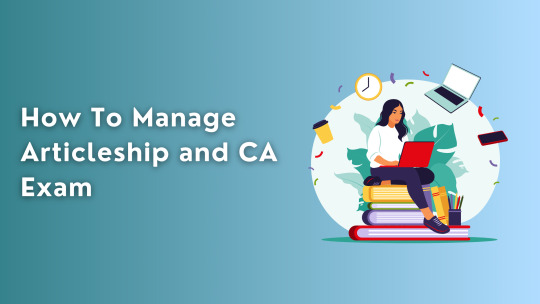
It can be difficult to balance articleship preparation with CA test preparation. However, both may be managed successfully with the correct tactics and tools. Here are some pointers for balancing articleship responsibilities with CA test preparation.
1. Create a Realistic Study Schedule
Making a realistic study schedule is one of the first stages to manage your articleship and CA test preparation. Determine when you work and set aside time just for studying. Cover the more serious elements of the syllabus throughout the weekends and vacations. In order to prevent burnout, make sure you take pauses.
2. Utilize the Best CA Books
Investing in high-quality study materials can significantly enhance your preparation. For the CA Intermediate level, CA Intermediate Books are crucial. These books are designed to cover the entire syllabus comprehensively and provide a solid foundation. Similarly, for beginners, it is essential to build the basics. As you progress, CA Final will be indispensable for advanced topics like CA Final Books , Study Material etc are those things.
3. Prioritize Your Tasks
It's critical to efficiently prioritize your chores when you're short on time. Concentrate on practical areas and gain knowledge from real-world applications during your articleship. Concentrate your study efforts on the subjects that are most important and will be tested on them. Utilize Books for CA Exam to identify key areas and prioritize accordingly.
4. Make Use of Study Material
Apart from standard textbooks, make use of additional Study Material For CA. Practice guides, review tests, and suggested responses from earlier exams are all included in this. These materials aid in practice a range of questions and offer insight into the exam format.
5. Stay Consistent
The secret to juggling articleship with CA test preparation is consistency. No matter how busy you are, set aside time every day for studying—at least a few hours. Maintaining regular study habits will help you stay on schedule and prevent last-minute scrambling.
6. Join Study Groups
Getting involved in a study group can be very helpful. Engaging in peer discussions on various themes may lead to a deeper understanding of the subjects as well as alternative viewpoints. Study groups also support maintaining responsibility and motivation.
7. Seek Guidance from Seniors and Mentors
Never be afraid to ask mentors and seniors who have completed their articleships and passed the CA examinations for advice. They can offer moral support, the greatest CA Books recommendations, and insightful advice.
8. Leverage Online Resources
There are a ton of internet tools available in today's digital age to help you prepare better. Video lectures, webinars, and online courses can offer more clarification on difficult subjects. For the CA exams, a variety of platforms provide study guides that include interactive sessions and mock exams.
9. Take Care of Your Health
While focusing on studies and articleship, do not neglect your health. A healthy mind and body are essential for effective studying. Ensure you get adequate sleep, eat nutritious food, and incorporate some form of physical activity into your daily routine.
10. Practice Time Management
Time management that works is essential. Divide up your study periods into smaller, more manageable halves, and utilize focus-boosting strategies like Pomodoro. To increase your speed and accuracy, practice answering questions in the allotted time by using the CA Exam books.
Conclusion
It takes careful time management, consistent study habits, and utilizing real-world experience to prepare for the CA tests in addition to an articleship. To thrive in both, set priorities for your career, look for guidance, and keep a healthy work-life balance. Relentlessness and consistency are essential for reaching your CA objectives.By following these strategies and making the most of the available CA Books and CA Entrance Exam Books, and , you can effectively manage your articleship while preparing for your CA exams. With dedication and smart work, achieving the coveted CA title is within your reach.
#ca final books#study material for ca#books for ca exam#ca intermediate books#ca entrance exam books#ca foundation books#studymaterialforca#study material
0 notes
Text
Navigating the New Scheme for Education and Training in CA Final Course

It's important to stay updated with resources and educational programs in the continuously changing rule of chartered accountancy (CA). The updated syllabus brought forth by the New Scheme for Education and Training aims to equip aspiring chartered accountants for the evolving demands of the business. In this blog post, we'll go over the key components of the new strategy, discuss recommended reading lists, and provide tips on how to perform well on the CA Entrance Exam.
Understanding the New Scheme for Education and Training
The New Scheme for Education and Training in CA represents a strategic shift towards a more practical and application-oriented approach. It emphasizes real-world scenarios, case studies, and hands-on learning to prepare candidates for the complexities of modern accounting and finance practices. The scheme comprises three levels: Foundation, Intermediate, and Final.
Navigating the CA Entrance Exam Successfully
The CA Entrance Exam serves as the gateway to the profession, assessing candidates' aptitude and readiness to pursue the CA course. Here are some tips for navigating the entrance exam successfully:
Understand the Exam Pattern: Familiarize yourself with the format and structure of the entrance exam, including the number of questions, duration, and marking scheme.
Create a Study Plan: Develop a structured study plan that allocates sufficient time for each subject. Prioritize areas of weakness while ensuring comprehensive coverage of all topics.
Practice Regularly: Regular practice is key to mastering the concepts tested in the entrance exam. Solve sample papers, attempt mock tests, and utilize CA Entrance Exam books to enhance your preparation.
Seek Guidance: Don't hesitate to seek guidance from experienced mentors, tutors, or fellow aspirants. Joining a coaching institute or online study group can provide valuable insights and support.
Stay Updated: Stay informed about any modifications or revisions to the ICAI's syllabus or test design. For the most recent information, subscribe to relevant publications or internet forums for discussion.
Latest Updates on ICAI New Scheme
The Institute of Chartered Accountants of India (ICAI) has released the updated syllabus for the CA Final course, applicable from May 2024. This new syllabus, under the new scheme of education and training, aims to better equip aspiring Chartered Accountants with the skills and knowledge needed in the dynamic field of accounting and finance.
Overview of the New CA Final Syllabus
The updated syllabus for the CA Final course consists of six papers, streamlined from the previous eight. This change aims to focus on core areas and eliminate redundancy. Each paper is designed to cover a comprehensive range of topics essential for the professional competence of future CAs.
Group I
Paper1:FinancialReporting
Focuses on Indian Accounting Standards (Ind AS), group financial statements, and financial instruments.
Key topics include Business Combinations, Consolidation, and Ind AS specific requirements.
Paper2:Advanced Financial Management
Covers strategic financial management, risk management, security valuation, and portfolio management.
Includes topics like derivatives, foreign exchange exposure, and mergers and acquisitions.
Paper3:Advanced Auditing and Professional Ethics
Deals with comprehensive direct tax laws including recent amendments and international taxation principles.
Topics include transfer pricing, BEPS, tax treaties, and taxation of digital transactions.
Group II
Paper4:Direct Tax Laws & International Taxation
Deals with comprehensive direct tax laws including recent amendments and international taxation principles.
Topics include transfer pricing, BEPS, tax treaties, and taxation of digital transactions.
Paper5:Indirect Tax Laws
Focuses on GST and Customs Law.
Key areas include supply, charge of GST, input tax credit, and procedures for import and export under GST.
Paper6:Integrated Business Solutions
A multi-disciplinary case study paper that includes strategic management and business solutions.
This paper requires the application of knowledge from all other subjects in practical scenarios.
Recommended Study Materials for CA Final Exam
Preparing for the CA Final examination requires access to high-quality study materials that cover the entire syllabus comprehensively. Here are some recommended resources
CA Final Books: A curated selection of textbooks authored by renowned experts in the field. These books provide in-depth coverage of each subject and serve as essential reference materials for exam preparation.
Scanner CA Final Books: Scanners are invaluable tools for CA aspirants, offering a collection of past exam questions categorized topic-wise. Practicing with scanners helps candidates familiarize themselves with the exam pattern and refine their problem-solving skills.
Study Material for CA Final Books: The Institute of Chartered Accountants of India (ICAI) provides official study materials for CA Final aspirants. These materials are meticulously crafted to align with the exam syllabus and often include case studies, illustrations, and practice questions to aid comprehension.
CA Entrance Exam Books: For candidates preparing for the CA entrance exam, a comprehensive guidebook covering mathematics, logical reasoning, and General Awareness is essential. These books help build a strong foundation in the subjects tested, ensuring thorough preparation and enhancing the chances of success in the exam.
Conclusion
The New Scheme for Education and Training in CA provides a modern way to prepare future Chartered Accountants for their professional challenges. By using the recommended study materials and effective study strategies, students can confidently and ability to navigate their CA journey. With hard work and dedication to success in the CA Entrance Exam and beyond is achievable.
#ca entrance exam#scanner for ca intermediate books#books for ca exam#ca entrance exam books#study material for ca#ca intermediate books#ca foundation books#ca final books
0 notes
Text
Optimizing Your Study Plan: Revised CA Intermediate Exam Dates for May 2024
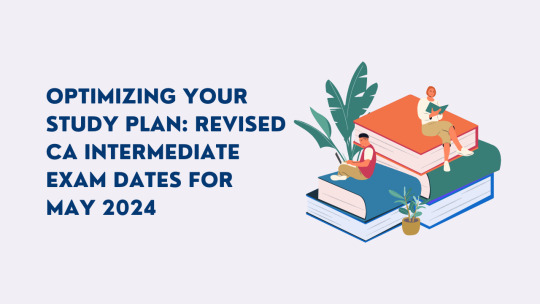
Introduction
In the realm of academic pursuits, aspiring chartered accountants eagerly await the unveiling of examination schedules, as these dates dictate the rhythm of their study routines. With the Revised CA Intermediate Exam Dates for May 2024 now available, it's paramount for candidates to recalibrate their study plans to align with these newly disclosed timelines. Here, we delve into the intricacies of the revised schedule, offering insights and strategies to optimize your preparation for success. Leveraging resources like CA Intermediate Books can significantly enhance your study regimen, providing comprehensive coverage of the syllabus and invaluable practice opportunities to bolster your confidence and readiness for the exams.
Understanding the Revised Schedule
The Revised CA Intermediate Exam Dates for May 2024 signify a pivotal moment for candidates embarking on their journey towards achieving CA certification. The revised timetable, meticulously crafted to accommodate various logistical considerations and unforeseen circumstances, outlines the timeline for the intermediate-level examinations. As a CA aspirant, comprehending the nuances of this revised schedule is indispensable for formulating a comprehensive study plan.
Strategic Study Approaches
Leveraging Additional Preparation Time
One of the primary advantages afforded by the revised exam dates is the extension of preparation time. This extension provides candidates with a valuable opportunity to delve deeper into intricate concepts, reinforce foundational knowledge, and engage in rigorous practice sessions. By capitalizing on this additional time, candidates can cultivate a more profound understanding of the subject matter, thereby enhancing their preparedness for the examinations. Utilizing resources such as ScannerCA Foundation Books can be particularly beneficial during this extended preparation period.
Adopting a Structured Study Plan
A structured study plan serves as the cornerstone of effective exam preparation. With the revised CA Intermediate Exam Dates delineating the timeline for the impending assessments, candidates must devise a meticulously structured study plan tailored to their individual learning styles and preferences. This plan should encompass dedicated study sessions, periodic revisions, and simulated mock tests to simulate exam conditions and fortify conceptual understanding.
Embracing Resource Diversification
Diversification of study resources is essential for cultivating a comprehensive understanding of the curriculum. Beyond conventional textbooks and lecture notes, candidates should explore supplementary learning materials such as online tutorials, instructional videos, and reference guides. Embracing diverse resources enriches the learning experience, offering alternative perspectives and elucidating complex concepts through varied mediums.
Navigating Challenges Effectively
Overcoming Procrastination
Procrastination poses a significant impediment to effective exam preparation, often derailing study plans and impeding progress. To overcome this challenge, candidates must cultivate a disciplined approach to time management, setting realistic study goals and adhering to predetermined study schedules. Additionally, adopting strategies such as the Pomodoro Technique, which involves alternating periods of focused study with brief breaks, can mitigate the temptation to procrastinate and enhance productivity.
Managing Exam Anxiety
Exam anxiety, characterized by feelings of apprehension and unease preceding assessments, can undermine performance and impede concentration. To manage exam anxiety effectively, candidates should implement relaxation techniques such as deep breathing exercises, mindfulness meditation, and progressive muscle relaxation. Moreover, fostering a positive mindset, reframing challenges as opportunities for growth, and visualizing success can bolster confidence and alleviate anxiety.
Conclusion
The Revised CA Intermediate Exam Dates for May 2024 herald a new chapter in the journey of CA aspirants, providing an opportunity to recalibrate study plans and optimize preparation strategies. By leveraging additional preparation time and incorporating resources like CA Final Books, and also CA candidates can adopt CA Foundation Books for study approaches and navigate challenges effectively. This enables them to embark on their CA entrance exam journey with confidence and determination. It's essential to remember that success in the CA Intermediate examinations hinges not only on diligence and perseverance but also on strategic planning and resource utilization.
0 notes
Text
Top Five Strategies to Make Notes for the Upcoming CA Intermediate Exam November 2023
Introduction
Preparing for the CA Intermediate Exam in November 2023 requires more than just studying; it requires effective note-taking strategies. Well-organized notes can be a game-changer in your exam preparation journey. In this article, we'll explore the top five strategies to make notes that will help you excel in your CA Intermediate exam.
1. Understand the Exam Syllabus
Before diving into creating your notes, it's crucial to have a clear understanding of the CA Intermediate exam syllabus. This will help you identify the specific topics and subjects you need to focus on. The syllabus serves as your roadmap, ensuring that your notes cover all the essential areas.
2. Organize Your CA Intermediate Study Material
Gathering all your study materials is the first step. Ensure you have your textbooks, class notes, reference books, and any other relevant resources at your disposal. Organizing your study material will save you time and ensure you don't miss out on essential information.
3. Choose the Right Note-Taking Tools
Selecting the appropriate tools for note-taking is crucial. Some students prefer traditional physical notebooks, while others opt for digital note-taking apps like Evernote or OneNote. Choose what suits your learning style and convenience.
4. Create a Consistent Note-Taking Format
Maintaining a consistent format for your notes is essential for clarity and easy review. Consider using headings, subheadings, bullet points, and numbering to structure your notes effectively. This format will make it easier to find information during revision.
5. Active Reading and Summarization
When reading your ca exam study materials, actively engage with the content. Highlight or underline critical points, definitions, formulas, and key concepts. However, don't attempt to transcribe everything verbatim. Instead, aim to summarize and simplify the material in your own words. This process enhances your understanding and ensures concise notes.
Additional Strategies to Enhance Your Notes
While the above strategies are fundamental, here are some additional tips to take your note-taking skills to the next level:
Visual Aids
Incorporate visual aids like diagrams, flowcharts, and tables into your notes. Visuals can simplify complex concepts and make them easier to remember.
Color Coding
Use a color-coding system to categorize different types of information in your notes. This can help you quickly identify and differentiate between concepts, examples, and formulas.
Regular Review and Revision
Set aside dedicated study sessions for reviewing and revising your notes regularly. Repetition is the key to reinforcing your memory.
Practice with Past Papers
Utilize past CA Intermediate exam papers which you can get in some of the best ca intermediate books to test your knowledge. This practice will help you identify weak areas that require more in-depth notes and practice.
Collaborate and Discuss
If you're part of a study group, consider discussing and sharing notes with fellow students. Collaborative learning can provide different perspectives and insights.
Conclusion
Effective note-taking is a vital component of your CA Intermediate exam preparation. By following these top five strategies and additional tips, you can create organized, comprehensive, and accessible notes that will significantly contribute to your success.
0 notes
Text
Understanding the Role of a Chartered Accountant in Business

A Chartered Accountant (CA) plays a crucial role in business, providing financial expertise and guidance to organisations. Their primary responsibilities include financial reporting, taxation, auditing, and advisory services. Here's a breakdown of a Chartered Accountant's key roles and functions in a business context:
Financial Reporting: Chartered Accountants are responsible for preparing and analysing financial statements, such as balance sheets, income statements, and cash flow statements. They ensure that the financial information accurately represents the company's financial position and performance, adhering to accounting standards and regulations. To become a successful Chartered Accountant aspirants can take the help of some of the best ca foundation books to qualify for their exam with flying colours.
Taxation: CAs possess in-depth knowledge of tax laws and regulations. They assist businesses in managing their tax obligations, ensuring compliance with tax laws while minimising tax liabilities. CAs provide advice on tax planning strategies, help with tax return preparation, and represent the organisation during tax audits or disputes.
Auditing: CAs perform audits to examine an organisation's financial records and assess the effectiveness of its internal controls. They conduct independent, objective evaluations to provide reasonable assurance that financial statements are reliable and free from material misstatements. Audits enhance transparency, accountability, and trustworthiness for stakeholders, including shareholders, investors, and lenders. Some of the best CA Entrance Exam Books would help the students to qualify in their CA Exams.
Advisory Services: Chartered Accountants offer valuable insights and guidance on financial matters to help businesses make informed decisions. They provide financial analysis, feasibility studies, and risk assessments to support strategic planning, investment decisions, and expansion initiatives. CAs also assist in financial management, budgeting, cost control, and performance evaluation.
Compliance and Regulation: CAs ensure businesses comply with relevant legal and regulatory frameworks. They stay updated with changes in accounting standards, tax laws, and other regulations to help organisations avoid penalties, fines, or legal issues. CAs provide advice on corporate governance, internal controls, and risk management to enhance compliance and mitigate financial risks.
Business Strategy: With their comprehensive financial knowledge, CAs contribute to the development and implementation of business strategies. They analyse financial data, identify trends, and provide insights on revenue generation, cost optimization, and resource allocation. CAs help align financial goals with the overall business objectives, supporting sustainable growth and profitability.
Financial Management: Chartered Accountants assist in financial decision-making and resource allocation. They provide guidance on capital structure, funding options, and investment opportunities. CAs monitor financial performance, assess financial health, and recommend corrective actions if necessary. They also aid in financial forecasting, budgeting, and cash flow management to ensure financial stability.
Conclusion:
In conclusion, Chartered Accountants (CAs) are essential for business prosperity. From financial reporting to tax compliance, auditing, and advisory services, they provide invaluable expertise. If you aspire to become a CA, it is crucial to prepare with the right resources. Consider utilising CA entrance exam books that cover all relevant subjects, including accounting, taxation, auditing, and business laws. These books serve as comprehensive study materials, helping you gain a strong foundation in the field. By combining your dedication with the guidance offered by CA entrance exam books, you can embark on a successful journey towards becoming a Chartered Accountant.
0 notes
Text
Ca Entrance Exam Books | CUET Books | CS | CMA | Scanneradda

CA Foundation Study Time Table For May 2023
You should have a schedule for your CA Foundation studies that includes daily, weekly, and monthly study schedules. Ensure that the study schedule includes portions for the CA Exams Test Series. The CA Foundation test is a requirement for the Chartered Accountancy Course. The exam is the first requirement for becoming a chartered accountant. Currently, passing the Foundation exam is challenging due to the low passing marks and negative marks. Students need to establish a plan for their study time if they want to ace the Foundation exam in the first attempt and also they need to study from one of the best ca foundation books for the best results.
The student who is preparing for CA Foundation benefits from setting specific, well-defined learning objectives. As a result, you should plan your free time as a student in order to give your studies your complete attention.
When preparing for the CA Foundation Course, it is important to analyse and reorganise the syllabus, assign specific time slots to each subject, and plan study sessions in advance. Additionally, taking practice tests can give candidates an insight into how well they are prepared for their upcoming exam. Lastly, allocating sufficient time for revising is critical in order to understand major topics before moving on.
CA Foundation self-study strategy
One can better learn a subject by employing examples that are relevant to him or her personally rather than relying on the lecturer's detailed examples. Create your own self-study schedule and learn at your own pace. Courses are taught at teaching centres at the usual pace, notwithstanding the fact that pupils learn at different rates.
You are not obligated to follow anyone else's schedule or constraints when creating your own self-study timetable for CA Foundation. You can study that subject whenever you choose, without anyone's permission.
Create a customised Study Schedule
A customised study schedule for a CA Foundation student should take into consideration the following factors:
Study pace: Set a realistic pace of studying, taking into account your current workload, level of understanding and how much time you can realistically commit to studying.
Exam date: Plan your study schedule around the date of the CA Foundation exam, making sure you have enough time to cover all the subjects.
Weaknesses: Identify the subjects you struggle with the most and allocate more time for them in your study schedule.
Study resources: Make use of study material from various sources, including best ca entrance exam book, online resources, and past papers.
Breaks and revision: Include regular breaks and time for revision in your study schedule to avoid burnout and consolidate your learning.
Example study schedule:
Day 1-2: 4 hours per day for Economics and Business Studies
Day 3-4: 4 hours per day for Business Laws
Day 5: Revision of Economics and Business Studies
Day 6: Revision of Business Laws
Day 7: Take a break
Day 8-9: 4 hours per day for Accounting
Day 10-11: 4 hours per day for Mathematics and Statistics
Day 12: Revision of Accounting
Day 13: Revision of Mathematics and Statistics
Day 14: Take a break
While making a study timetable, the following things should be focused on:
Goals: Set specific, achievable study goals for each subject, with a focus on areas where you struggle the most.
Time management: Allocate sufficient time for each subject along with allocating time for breaks and revision.
Prioritisation: Prioritise subjects based on their weightage and level of difficulty, allocating more time to the subjects you struggle with the most.
Study methods: Consider different study methods, such as active learning (e.g. practice questions, summarising), and alternate between these methods to keep things interesting.
Realism: Make sure the study schedule is realistic and takes into account any other commitments you may have, such as work or family responsibilities.
Flexibility: Be flexible and adjust the study schedule as needed, based on your progress and level of understanding.
Breaks: Regularly schedule breaks and time for relaxation, to avoid burnout and ensure you are able to maintain focus over the long term.
Guidelines for 1 month study plan for CA Foundation:
Mathematics:
Identify the specific topic you need to study.
Review the basics and essential formulas for the topic.
Allocate time for studying, e.g. 2 hours a day, 5 days a week.
Create a study schedule, breaking down the topic into smaller, manageable sections.
Use different resources, such as textbooks, online tutorials, and practice problems to deepen your understanding.
Solve practice problems regularly to test your understanding and identify areas that need improvement.
Economics:
Start by reviewing the basic principles of economics.
Set a study schedule, allocating time each day or each week to economics.
Practice applying economic concepts by solving problem sets, participating in case studies, or working on projects.
Stay up to date with current economic events and analyse how they relate to the principles studied.
Make flashcards or summarise key concepts and theories in your own words to improve retention.
Consider finding a study group or a tutor to discuss economics with and to receive additional support.
Law:
Allocate specific time slots for studying each subject, taking breaks, and reviewing what you have learned.
Practise active learning techniques such as summarising, asking questions, and explaining the information to someone else.
Join a study group or connect with classmates to discuss and review material, ask questions, and receive feedback.
Apply what you have learned by doing practice questions, writing essays, or taking mock exams.
Keep track of important dates, deadlines, and notes in a planner or an app to stay on top of your studies.
Accounts:
Start with the basics: Ensure that you have a solid understanding of fundamental accounting concepts and principles.
Make a study schedule: Dedicate specific time slots for studying each topic, taking breaks, and reviewing what you have learned.
Use a variety of resources: Utilise textbooks, lecture notes, online tutorials, and practice problems to deepen your understanding.
Practice regularly: Complete practice problems, take mock exams, or work through real-life case studies to apply what you have learned.
Focus on areas of weakness: Identify the areas where you struggle the most and dedicate extra time to studying those topics.
Collaborate with others: Join a study group or connect with friends to discuss and review material, ask questions, and receive feedback.
Stay organised: Keep track of important dates, deadlines, and notes in a planner or an app to stay on top of your studies.
Take breaks: Regular breaks help to refresh your mind and prevent burnout. Take breaks to relax, exercise, or meditate.
Stay up-to-date: Stay informed of recent developments and changes in accounting to maintain a broad perspective and improve your problem-solving skills.
CA Foundation Study Plan for 3 months:
Here's a high-level 3-month study plan for CA Foundation:
Month 1:
Start with the basics of Accounting, Business Laws, and General Economics.
Make brief notes for each subject and revise regularly.
Take mock tests and analyse your strengths and weaknesses.
Month 2:
Focus on strengthening your weak areas and revise all subjects thoroughly.
Start practising problems and take more mock tests.
Give special attention to Accounting, it carries the maximum marks.
Month 3:
Revise all subjects one final time and focus on your weak areas.
Take as many mock tests as possible to build your confidence.
Get clarification on any doubts you have before the final exams.
Conclusion:
Creating a study timetable and following a regular schedule when preparing for the CA Foundation Exam in May is essential. Allocating time to each subject, getting familiar with question types, attending tuition classes, discussing difficult concepts with experienced accountants, studying from some of the best ca entrance exam books and taking practice tests online or through books can help improve chances of success in the exam. Utilising all these resources combined with hard work and dedication will ensure your success.
#cafoundationbooks#CA Entrance Exam Books#CA Foundation Book#CA Intermediate Books#CA Final Books#ca foundation scanner#books of ca foundation
0 notes